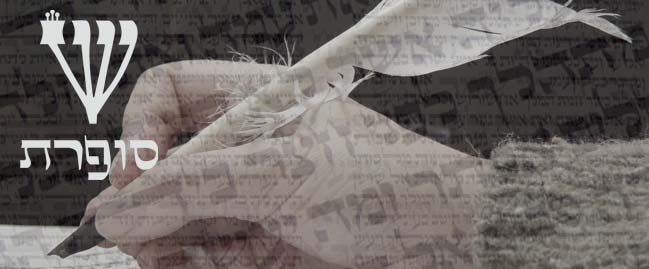& NOW, A LITTLE MIDRASH...
בס"ד
T"U b'Shevat
Here's some of what I spoke about to the Temple Beth Am ladies luncheon when I was in Miami recently:
The letters of the word "Torah" (תורה)
The Letter Tav:
The first "sign" (from the root T-V-H, "to make a mark or a sign") mentioned in the Torah is found in Breyshit/Genesis 4:15. G@D placed a letter of the alef-bet on Cain's forehead. Nachlas Benjamin of Tachuma teaches that the sign was in the form of a Tav (Midrash HaGadol).
Yechezkel/Ezekiel envisioned (Ch. 9) that at the destruction of Jerusalem, G@D commanded the angel Gavriel to mark the foreheads of the upright with a Tav of ink and on the foreheads of the wicked mark a Tav of blood. Rav comments that the first Tav stands for "Tich'yeh" - "live!" or "you shall live!" - while the Tav of blood stands for "Tamut" - "die!" or "you shall die!" (Shabbos 55a).
There are two Tavs who are written larger than usual in the Tanakh: the first is in Devarim/Deuteronomy 18:13, "Tamim tihiyeh im Ha-Shem Eloqekha..." - "Be perfect with HaShem your G@D...". "Perfect" here is interpreted to mean "completely focused". The second large Tav is found in the Megillat/Book of Esther 9:29. "Vatikhtov Esteyr..." - "And Esther wrote...", tells us of the incredible courage and perfection of character Esther showed in her efforts to save the Jewish people.
The Letter Vav:
The Maharal teaches us that the number six, the gematria of Vav, indicates physical completion: as our world was finished in six days and as each individual object has six sides: above, below, right, left, front and back.
Vav is a conjunction, a link. He comes to us in the shape of a hook, which is the function he fulfills and what his name means. The presence of Vav at the beginning of a verse in the Torah indicates continuity with the previous text ("V'eyleh sh'mot b'nai Yisra'el..." - "And these are the names of the children of Israel..."). Vav's absence means we are beginning a new subject. Vav has the power to unite anything.
There is a broken Vav in Bamidbar/Numbers 25:12. G@D says of Pinchas, "Hineyni, noteyn lo et briti shalom - See, I give him My brit/covenant/promise: peace." Pinchas was rewarded by G@D for his devotion, but it is a broken, crippled promise because the peace brought about by Pinchas came through killing.
The Letter Reysh:
We are the Reysh, seeking G@D, the Quf (that's the letter that preceeds it in the Alefbet). The leg of the Quf is suspended in midair to show that when we return, do tshuvah, we will find an open route into the inner part of G@D's Holy Presence. If the left side of Quf were closed, the returning Reysh would be forced to reach around to the far entrance at the bottom of Quf, meaning that the return would be difficult and the welcome inhospitable. Since the open side of Quf faces Reysh, we all have easy access to The Holy One.
The Letter Hey:
Hey has the easiest voice. The sound of Hey is only your out-breath, the exhalation of prana. It needs no effort, no motion of lips, tongue or mouth (Tanchuma Bereishis 16).
Our spirit (ru'ach) lives in our breath (ru'ach), IS our breath. The Kabalah says that when two people are talking together and their faces are so close they inhale the other's breath, they are sharing souls. According to Hasidism, our souls are too vast to inhabit our bodies; they penetrate and surround them.
Hey is female. Her soft-sounding voice indicates the feminine form of a noun, as in yeled (boy) - yaldah (girl). The two Heys in The Four-Letter Name represent the Mother and the Daughter in the archetypal Family, Yud representing the Father and Vav the Son.
G@D created two worlds: this one with the letter Hey ("Bid'var HaShem shamayim na'asu uv'ru'ach piv kol tzeva'am" - "By the word of HaShem the heavens were made and by the breath of His mouth all their hosts" Tehilim/Psalms 33:6). Why? Our traditions tell us that this world is like the letter Hey, easy to fall out the bottom. Also like this world there is always a tiny space, which allows another entrance. This is t'shuvah, repentance (Menachos 29b). This teaches us to leave a small opening in our hearts to let others back in when they have hurt us and wish to be forgiven (Tomer Devorah 1:7).
...& most of us need to forgive ourselves for something or other...
ps: Happy Birthday, BJC
Technorati tags: religion, Judaism, Torah, midrash, Alefbet, forgiveness, Teshuvah.














4 Comments:
This is wonderful, thank you!
בס"ד
Don't thank me, thank G@d!
:D
Thank you G-d and thank you Aviel- this was fascinating!
בס"ד
:D
Post a Comment
<< Home